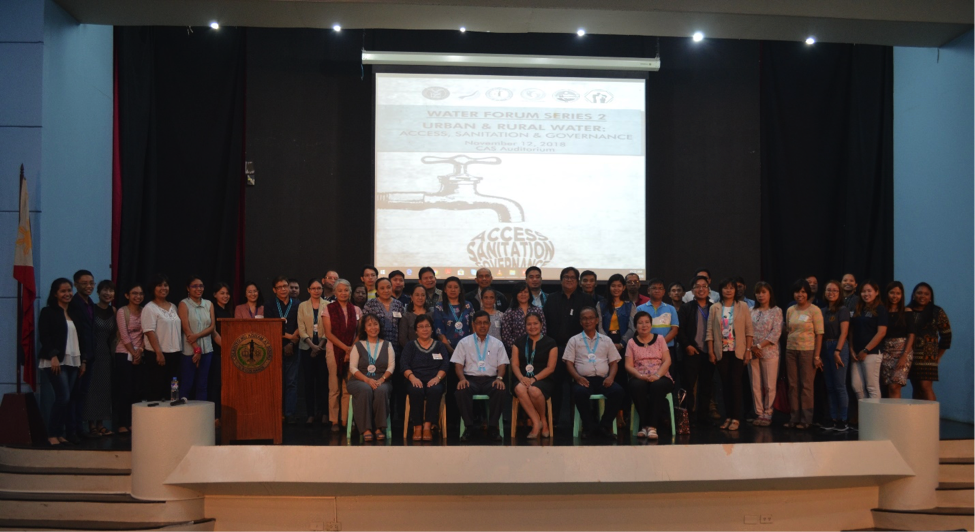
The University of the Philippines Los Baños Interdisciplinary Studies for Water conducted its 2nd Water Forum on urban and rural water last November 12, 2018 at the College of Arts and Sciences Auditorium. With the theme “Urban and Rural Water: Access, Sanitation and Governance”, the main objective of the forum is to determine the status and challenges of rural and urban water in the country. National Government Agencies, Local Government Units, International Organization, Non-Government Organization and academe among others attended the forum.
Dr. Marish S. Madlangbayan, Vice Chancellor for Planning and Development welcomed the participants. Dr. Patricia Ann J. Sanchez, Chair of the UPLB Water Center and Professor, School of Environmental Science and Management (SESAM), delivered an overview presentation, while Dr. Raden G. Piadozo, Dean of the College of Human Ecology, enumerated the agenda of the forum.
Dr. Felino P. Lansigan, Dean of the College of Arts and Sciences discussed the status and threats of urban and rural water resources in the country. He highlighted that climate change is one of the factors affecting water resources in the country. Water security issues include accessibility, availability, affordability, sanitation, governance and sustainability, he added.
Ms. Rona Raisa Ramos of TySeven UK disccused community-based infrastructure and sanitation. She emphasized that the common problems in local areas are open defecation and low financing for water and sanitation facilities.
Dr. Damasa B. Macandog, Professor, Institute of Biological Science, CAS-UPLB, lectured on water transboundary issues in the case of Santa Rosa, Laguna. She higlighted the upstream and downstream connection or the ridge-to-reef concept in analyzing a watershed. She also added that there is a higher demand for water at the urban areas.
Regarding the terms of water access and sanitation in urban and rural areas in Laguna, Engr. Virginia Fabros of the Laguna Provincial Health Office emphasized that there are programs and initiatives in addressing these issues but there should be a clear collaboration between various institutions. She also encouraged everyone not to patronage unregistered“sip-sip poso negro”companies.
Ms. Crispina Muan of the Laguna Lake Development Authority discussed managing water resources in urban and rural communities, wherein she elaborated the commitments done by their agency. It includes environmental education, community-based people’s planning, information drive, massive campaign on waste segregation and zero waste and developing new policies for watershed sustainability.
From the private sector, Engr. Christian Henry Lacson of Laguna Water District Aquatech Resources Corporation, talked about managing water system in some of the municipalities of Laguna. He highlighted that there should be a balance between services and tariffs. Additionally, they already have calibrated hydraulic models.
The last plenary speaker was Mr. Rogelio Ocampo from the Department of Interior and Local Government, who discussed the local government initiative on water. The existing set-up of water institution in the country is fragmented, he added. Also, he said that there are too many policies that makes the LGU confused. Hence, there is a need for a unified implementation of existing policies and plans.
Some of the suggested actions during the workshop is to create an apex institution on water to address the fragmented set-up of water agencies in the country and to implement of culturally-sensitive IEC. Also recommended was the compliance to international agreements and implementation of multisectoral capacity building and collaboration. (Jessa O. Aquino and Catherine B. Gigantone)

